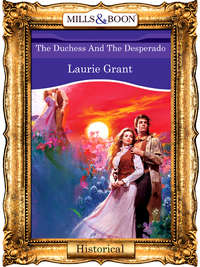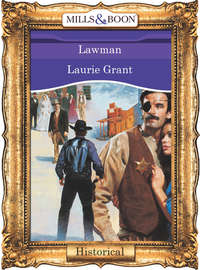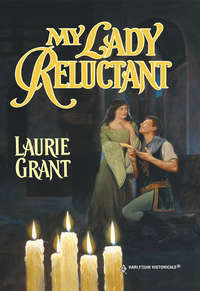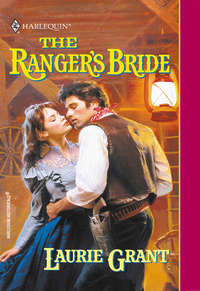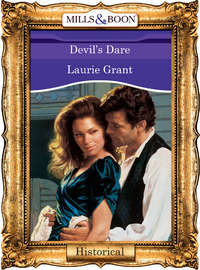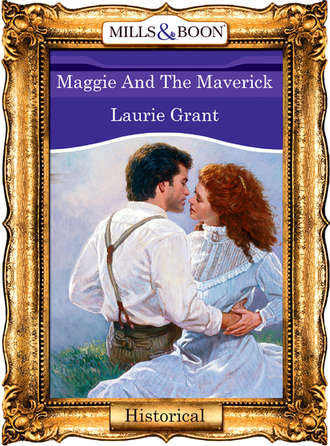
Полная версия
Maggie And The Maverick
Every fifteen miles the coach had stopped to change teams, but it was usually raining too hard for Maggie to get out and stretch her legs. Every fifty miles they’d halted for a longer time, so the passengers could eat, drink and relieve themselves, but the stations were crude and dirty and the food was hardly fit for consumption.
The coach creaked to a stop, and after Maggie descended, the driver lifted her bag down to her.
“Thank you, sir. I hope the last leg of your trip goes smoothly,” Maggie said.
“You’re welcome, Miz Harper. You’d better get up on the boardwalk yonder before those boots’re soaked through,” the driver said, pointing to the mud that squished up to her ankles. “Ain’t ya got someone meeting ya here?” “Oh, someone’s expecting me, sir, don’t worry. I just have to find my way to the newspaper office.”
A small town, Gillespie Springs nevertheless had a prosperous look on this sunny April morning. Next to the hotel on her right, Maggie could see signs announcing a millinery and a barbershop. When she turned to look to her left, she saw a bank, a doctor’s office, a general store, and across the street from those buildings, the saloon, the jail, a telegraph office and the livery. So where was the newspaper office? Then she noticed the small, new-looking building right across the street.
She narrowed her eyes to read the sign swinging in the breeze beneath the new building’s overhanging roof. “The Gillespie Springs Gazette, Established 1869,” she read aloud. Yes, this was it. The ad in the newspaper seeking an experienced pressman, or printing press operator, had mentioned that the venture was a new one. When she had written offering her services, Garrick Devlin, the editor, had responded with flattering speed.
Of course, Devlin might not have done so had she signed her letter with “Margaret Louise Harper” rather than “M. L. Harper.” Pangs of guilt had assailed her all the way from Austin, but she knew she had to find a way to leave there, and if misleading a prospective employer about her sex would secure her a job in another town more quickly, then mislead she would. Surely once she told Mr. Devlin why she was every bit as qualified as a male printer, he’d give her the chance to prove herself.
Garrick Devlin. She’d formed a picture of him in her mind. With a name like that, he must be an older man, probably in his fifties, with a balding head and spectacles perched on his nose. He’d have a plump, comfortable wife and a brood of grown or nearly grown children. Perhaps he’d already be a grandfather, and if so, no doubt he’d be a doting one. He might be skeptical of hiring a woman, but she’d tell him about her experience. Why, she’d started as a printer’s devil for her father, a veteran newspaperman, back in Ohio, and progressed to the point that when they got to Austin she’d been John Harper’s most-relied-upon reporter.
Devlin had to accept her! She just couldn’t go back to Austin! She’d rather die than face the knowing looks, the sneers, or the attentions of the officers and officials of the Freedmen’s Bureau, who suddenly seemed to find her irresistible—ever since Richard Burke had left her house that night.
Of course he had boasted of his conquest. She’d known it the very next week, when she’d gone with her father to a New Year’s Eve ball put on by the army for its staff and the rest of the Northeners who now lived in Texas. She’d seen the ladies whispering behind gloved hands in corners, staring in her direction, only to fall silent when she approached. They were distant and vague when she tried to converse with them, and some even looked right through her and walked away with an angry swish of skirts—as if she were a saloon girl who’d dared to trespass where only ladies were welcome!
Her dance card had been full that night, though, a fact that only seemed to make the officers’ wives and daughters hate her more. But she could take no joy in being the belle of the ball, for it was achingly clear that the men who danced with her were only looking to sample the delights Captain Burke had told them about.
Of course her sudden change in popularity—a belle on the dance floor, a pariah among women—could not escape her father’s attention, even as absentminded and preoccupied as James Harper could be at the best of times. She’d had to tell him what had happened between herself and Captain Burke. It was only the second time she’d ever seen her father cry; the first time had been when her mother had died. He hadn’t condemned Maggie, though. He’d been so kind and loving that she’d felt worse than ever.
She didn’t have to worry about him doing any violence to Burke—though he’d expressed a fervent desire to hurt him—because the captain had suddenly and conveniently been “called to Washington” two days after his last meeting with Maggie.
Maggie knew she’d been fortunate beyond measure when her “monthly visitor” came as usual two weeks after Burke’s departure, for she could imagine no hell worse than having to carry the fruit of her foolish liaison. Now they could put this unfortunate happening behind them, her father had told her, and things could go back to normal.
James Harper had protested when she’d told him she had to leave Austin. Things would blow over, he’d said—but she knew they would not. Her position there was untenable. Even though she was willing to forgo what social life there was for Yankees in Texas, and just live for her work, she could no longer endure her father’s pitying kindness in the midst of her disgrace.
Maggie couldn’t tell him that, of course. She’d told him she needed a change of scene, to try her wings. He’d been adamantly against her going off alone to take a position, but she had reminded him she was an adult with some limited funds of her own, and in the end he had given her his reluctant blessing.
Now she took a deep breath and began to wade through the ankle-deep mud that separated the newspaper office from the hotel.
Chapter Three
Garrick leaned over the shiny black Washington handpress that held pride of place in the middle of the office of the Gazette, holding on to the sides of the machinery as if it were a raft in the midst of a stormy sea.
Perhaps it was a mistake to have come in today, one day after his solemn-faced brother Sam had brought over the letter from Houston. Full of misspelled words and barely legible writing, the letter had been written by a semiliterate friend of Martha Purdy, the woman who had brought little Johnny to him. She thought he ought to know, she wrote, that Cecilia Prentice had passed away in the third week of March. She had died in her sleep, and her “husband” had barely waited through the brief funeral service before he’d started seeking another wife.
Sam had urged Garrick to stay home today, to take it easy while his mind absorbed the shock of his faithless wife’s death. Hiding at home didn’t make sense to Garrick. Cecilia had been as good as dead to him ever since she’d left him, he’d told Sam sourly, though deep inside, Garrick had known that wasn’t true. Some small voice inside of him had never stopped hoping that a miracle would take place and she’d recover and come home so they could learn to be a family.
And now it would never happen, and there was no point in staying in the new house that hardly felt like home yet, mourning for a woman who’d already been dead for a fortnight. Johnny didn’t really understand what Garrick had tried to tell him about his mother, so there was nothing he could do for his son.
Besides, the man he’d hired to be his pressman was a couple of days late in arriving—probably due to the recent spate of rainy weather—and Garrick didn’t want the fellow looking high and low for him all over Gillespie Springs when he didn’t find him in the Gazette office. So Garrick had kissed his son goodbye, told Jovita Mendez he probably wouldn’t be back until suppertime, and left his house on South Street. He’d made a brief stop at the general store to purchase a black mourning band to put on his upper arm, but had dodged questions about whom he was wearing it for.
Garrick had been at the office now for three hours and had written several stories about local goings-on. He had no idea, though, if his new employee would arrive before he was forced to discard the longhand copy as old news.
If only he knew how to run the damned press! Garrick stared down at the bewildering, monstrous contraption.
But what if “M. L. Harper” had changed his mind about coming, and was not even on his way?
The damp weather had made Garrick’s missing lower leg throb like a toothache. Lord, but he’d swear that he could feel each toe curling with the punishing pain. And the bandaged stump felt red and raw from rubbing against the harness that anchored his wooden limb to his body.
All at once the bell over the door jingled, and he looked up to see a woman letting herself in. He’d never seen her before, and in the two months he’d been residing in the small town, he thought he’d met everyone. She wore a traveling costume of coppery brown trimmed with black velvet at the hem and neckline. Perched on her head was a charming little confection of a hat trimmed with a wide band of copper ribbon, over which was a narrower one of black velvet
It was not her hat that held his attention, however, but the mass of flaming, auburn-red hair beneath it. He’d never seen hair that color. When she turned slightly, he could see it was confined in a demure black snood at the nape of her neck, but within the netting, curls coiled in fiery profusion, lit by the sun coming through his window.
He saw green eyes staring at him with wide-eyed astonishment, and wondered what she found so surprising. He hadn’t moved yet, so it could not be that she was shocked by his awkward gait,
“May I help you, ma’am?” She must be lost, though how anyone could get lost in a town the size of Gillespie Springs was a mystery to him. She was probably looking for the millinery, he decided, taking in her fashionable appearance. Well, he wished Phoebe Stone joy in her new customer. Perhaps she was a relative of the mayor, come for a visit?
“I believe I’m here to help you, if you’re Mr. Devlin,” she said, smiling a little as she held out her gloved hand.
Her clipped Northern voice raised his hackles immediately. The Yankee who had shot him in the leg had had just such an accent; Garrick still heard that harsh voice in his nightmares calling to his comrades, “Well, I was aimin’ for his heart, but I winged him, at least—either way, he won’t be killin’ Yankees no more!”
Garrick straightened, and taking his cane from where it leaned against the press, approached the woman who stood at his counter. He saw her eyes fasten on the cane and then fly back to his face. He saw the color heighten as she realized he’d caught her staring.
He was used to that reaction from women. “I’m Garrick Devlin,” he said, his voice cool. Then he added, with a deliberate lack of courtesy, “Who’re you?”
She blinked at his tone, and her smile faded, but her eyes were steady. He saw her straighten her backbone as if preparing to fend off a blow. “I’m M. L. Harper, your new pressman. I’m sorry to have arrived later than I told you to expect me, but the roads between this town and Austin are a river of mud, as I’m sure you can imagine.” Her voice trailed off for a moment, then began again. “But in any case, I’m here now and eager to go to work, if you’ll just show me where to put my bag? Ah, I see you have a Washington handpress! It’s not the latest in presses, but I have had vast experience using it.”
Her words went on, but he was still focusing on the first thing she’d said. “You aren’t M. L. Harper. You’re a female.”
The smile returned to her face, this time with a teasing quality. “I don’t like to argue with a new employer, but I am M. L. Harper—that’s Margaret Louise Harper, sir. And I assure you that while I am indeed female, I have had the experience I wrote you about. I was an only child, and my father, frustrated at not having a son to pass on his newspapering knowledge to, trained me in every aspect of journalistic endeavor—pressman, compositor and writer of editorials. I can do much more than the paper folding and coloring in of prints that are all a woman usually is allowed to do on a newspaper. Look, Mr. Devlin,” she said, holding up her long, slender fingers. “My hands are small, which makes them more nimble than a man’s. I can set more ems a minute than any man.”
“The hell you say,” Garrick retorted bluntly, not having any idea what an em was, and for the moment, not caring. He was too furious at the realization that he’d been tricked—and by a female again.
She raised an expressive eyebrow at his rough language, but he was damned if he’d apologize—not when she’d lied to him as she had.
“Indeed I have. Most recently I served as my father’s righthand reporter in Austin—”
“You’ve worked on the Democratic Statesman?” he demanded. “I don’t believe it.”
“No,” she said evenly, “for Freedom’s Voice.”
He let his lip curl with all the contempt he felt. “Oh, that carpetbagger paper. I should’ve known.”
“In our circle, the Statesman was known as ‘that rebel rag,’ sir,” she retorted sweetly. “Nevertheless, as a journalist I respect newspapers of any political persuasion, as our country was founded on freedom of the press, isn’t that so? And you did send for me to help you with yours.”
“I didn’t send for a Yankee, or a woman,” he growled between clenched teeth. “And you’re both.” He could feel the throbbing in his leg rise to a pain-filled crescendo. “You lied to me, and I don’t like being lied to,” he told her. “So you can just take the stage on back to Austin, Miz Harper. I don’t like your kind, descending on Texas like a plague of locusts.”
“Is it just my geographic origin you object to, or my sex, too? Would you let me work for you if I came in drawling and fluttering like a Southern woman? ‘Please, suh, may ah work for y’all?’“ the woman mocked in an exaggerated Southern falsetto.
He could feel the rage flooding his system, rage that this lying female should dare to mock him! “Miz Harper,” he said, allowing his own natural drawl to pour out like acidtinged honey, “Southern ladies stay at home and mind their own business, so I just can’t picture that happening. The fact that you’re not home tending your knitting tells me that either the Yankees have different standards for ladylike behavior or you’re no lady. Why else would you have left your cozy place with your father? And yes, there’re two things I won’t stomach in any employee of mine, Miz Harper—bein’ a Yankee and bein’ a female. So you can just tote that carpetbag on out of here. I lost my leg to your kind, and I won’t tolerate you here, do you understand?”
He saw her blink back the tears his tirade had caused, and for a moment he felt ashamed. Then he saw her chin rise defiantly.
“In your inexperience, Mr. Devlin, you don’t know that most men in my line of work have an unfortunate tendency to drink on the job, and get the urge to go on to the next job as soon as you’ve learned to depend on them. My reasons for leaving my father’s newspaper are none of your concern, sir. Suffice it to say that I have reached my majority and am free to look out for my own interests. You said you needed someone to help you operate the Washington there,” she said, nodding toward the machine in back of him. “I can do that. You obviously do not know how to do so yourself. Do you want to cling to your hidebound ideas, sir, or do you want to run a newspaper?”
He had to admire her for standing her ground. She hadn’t said anything about his nasty insinuation that she could not possibly be a lady—she’d just coolly reasserted her abilities. Nevertheless, he wasn’t going to have a Yankee carpetbagger woman running his press!
Just then their duel of words was interrupted by the breathless arrival of Hank Sweeney, the telegraph operator, who’d obviously run clear down the street from the telegraph office past the bathhouse. “Read this, Devlin! This is just in off the wire from Austin!” he said, slamming a piece of paper down on the counter between Garrick and the Yankee woman.
“’Radical Republicans chooses E. J. Davis as candidate for governor.’“ Garrick read Sweeney’s transcription of the dots and dashes aloud. “’Their ally General Reynolds has ear of President Grant.’ Why, this is a disgrace! No respectable man in Texas would vote for this scalawag—yet he’s as good as elected since he’s got that Yankee general on his side!”
“Wouldn’t you like to print that news, Mr. Devlin?” challenged the Yankee woman behind him. “Can’t you just picture it as a banner headline of the first edition of the Gillespie Springs Gazette? You’ve got other stories ready, haven’t you?” she said, pointing toward the pile of papers filled with his scrawling script. “Say the word, Mr. Devlin, and that edition can be done by morning—maybe sooner! I won’t sleep until the press has run off the story. Do you want to stand on your pride, and watch me walk away, or do you want to be the editor of a real working newspaper today?”
Hellfire, but she had him there, and she knew it, damn her knowing green eyes. If he told her to leave now, it might be weeks before he managed to hire a man knowledgeable in the operation of a printing press. By that time Davis’s candidacy would be worse than old news, and how many more exciting stories would remain unreported? The town council had also been eager for him to start operation so they could publicize their community far and wide.
“How many others have you told, Sweeney?” he asked the telegraph operator, turning away from Margaret Harper.
“Why, no one, Mr. Devlin,” the man answered, his face earnest.
“See? Your paper’s inaugural issue would sell like hot cakes,” Margaret Harper said in her pushy way. “Why not give me a chance, Mr. Devlin? Let me put out this first edition for you, and you’ll see how well I can work. If you don’t think I’m as good as I say I am, I’ll take the next stage out of Gillespie Springs with no hard feelings, I promise. Please, Mr. Devlin?”
He looked at her, sensing she hated begging, and momentarily savored being in the position of having her plead to him to take her on. And then he saw the pain and the fear deep within those green eyes, and he was ashamed of himself.
“All right, Miss Harper, I’d be willing to employ you for a trial issue, and after that we’ll see, is that understood? If I find I can’t get along with you, you’ll leave?” He didn’t believe for a moment her claim that she would depart without any hard feelings, not with that red hair and those fiery green eyes, or the way she had of raising her chin in the air. There’d be hard feelings, all right, if he told her he couldn’t work with her. If she stayed, he knew as sure as he was standing there he’d be apt to spend a good deal of his time clashing with this opinionated, bold woman who was surely no lady. He’d have to make certain she knew who was boss. But he wanted to start up his paper and report this story, and if that meant putting up with this Yankee woman at least temporarily, then that was the sacrifice he’d have to make.
“Sweeney, can I count on you not to blab this story all over town, at least until the paper comes out tomorrow morning?”
“Why sure, Mr. Devlin,” the telegrapher said, goggleeyed. “It’s a deal, as long as you’ll give me one of the first papers, hot off the press!”
“Does that mean you’ll give me a chance, Mr. Devlin?” Margaret Harper asked in an excited voice. She extended her hand, evidently expecting him to shake it to seal the deal. “You won’t be sorry, sir, I promise you.”
Garrick was sure he would be sorry, but it was too late now. Bemused, he had just taken her hand in his when the bell over the door tinkled and a familiar voice cried, “Papa, look! We brung your dinner!”
Chapter Four
Maggie whirled around and beheld a little boy dragging a covered basket through the door. Behind him followed a sturdily built Mexican woman with salt-and-pepper hair, her face amused at the child’s efforts.
The boy was beautiful, his blue eyes—the same piercing blue as Devlin’s, she noted absently—shining as he brought the basket to the man he’d called “Papa.” So Garrick Devlin was a father. Who was the mother of this beautiful child? Surely not the Mexican woman?
“You said you would not be back teel supper, Senor Devlin, and Johnny, he worries that you weel get hungry,” the Mexican woman said with a smile. “We pack you a peekneek, yes?”
Maggie saw Devlin’s face, set in harshly suspicious and disapproving lines when he looked at her, transform as if by magic as he gazed at his son. He took a couple of awkward steps forward, leaning on the cane, and clumsily knelt down in front of the boy as if he had totally forgotten Maggie’s presence.
“Thank you very much, Johnny, that was extremely kind of you,” she heard him say. “But I’m afraid dinner is going to have to wait awhile. Right now, I need to follow Mr. Sweeney down to the telegraph office so I can find out some more things about a big story I need to write for the newspaper.”
The boy’s face fell. “But I wanted to eat with you, Papa! Jovita packed a lot of food…”
Devlin looked distressed, but said, “Johnny, I just can’t eat right now. I know you don’t understand, but I need to do something else. Perhaps we could have a picnic tomorrow?”
“Mr. Devlin, if I may suggest…” Maggie began. She saw him frown at her, but rushed right on. “Why not go down to the telegraph office and wire for the details you need, and we can get your picnic ready for you? Then, while you’re waiting for a reply, you can come back and eat with your son. Isn’t that a good idea?” she said with an encouraging smile.
His glare told her in no uncertain terms what he thought of her volunteering her opinion the way she had, but just then Johnny piped up. “Papa, who’s the pretty lady? She talks funny, don’t she, Papa?”
“Doesn’t she,” Devlin corrected. “But it’s not polite to say so. This is Miss Margaret Harper, Johnny and Jovita. She—” Maggie saw him struggle to appear calm as he made the announcement “—is about to begin a probationary period as my printer.”
Maggie saw a flicker of surprise light the onyx depths of the Mexican woman’s eyes, to be replaced by a twinkle of amusement. “Welcome, Senorita Harper. And you are right—Senor Devlin should do as you say about the peekneek. Andele, Senor Devlin,” she said, making shooing motions. “We will have the dinner all ready by the time you come back. Do not worry, there is plenty for your new employee, too.”
Johnny stared at his father anxiously.
Maggie could tell Garrick Devlin liked nothing less than to be told what to do by a woman, any woman, but for some reason he did not reprove Jovita.
“All right,” he said in a deceptively agreeable voice, smiling at his son as the boy crowed with glee. Then Devlin’s eyes fixed on Maggie, promising trouble, as he spoke to the telegraph operator. “Sweeney, go on ahead and I’ll join you in a moment.” He paused, waiting for the man to walk out of earshot before saying, “Miss Harper, come outside with me for a moment, will you? I have some instructions to give you before I go down to the telegraph office.”
She nodded and followed him out the door.
He did not pause until he was several yards away from the newspaper office, and did not even look behind him to see if she was following. She could only watch the awkward, stiff-legged gait his artificial limb forced on him until he turned around and faced her.
“Miss Harper, if you’re going to work for me, there had better never be a repetition of what you just did,” he growled.
“What I just did?” she echoed, trying to think of how best to defend herself, without losing either her job or her self-respect.


